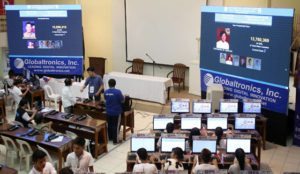The economic agenda of presumptive President Rodrigo Duterte will focus on tax reforms, rural development, ramping up infrastructure spending and attracting more foreign investments, among others, a member of his transition team disclosed on Thursday.
Carlos Dominguez, former Agriculture secretary, bared the incoming administration’s eight-point economic agenda.
He said Duterte will continue current macro-economic policies.
There will be reforms in the tax revenue collection by the Internal Revenue and Customs bureaus, however.
“This will fulfill the President-elect’s promise that there will be less corruption in the government,” Dominguez said in a televised news conference in southern Davao City, where Duterte is the mayor.
He added that infrastructure spending will be accelerated to create jobs.
This will be done, according to Dominguez, by addressing, among others, major bottlenecks in the Public-Private Partnership or PPP program.
The Duterte administration will set aside five percent of the country’s gross domestic product or GDP for infrastructure spending, Dominguez said.
The new administration will also “ensure attractiveness of the Philippines to foreign direct investments by addressing restrictive economic provisions in the Constitution and our laws and enhancing competitiveness of doing business in the Philippines.”
Dominguez said the government will speed up issuance of business licenses and reduce crime “to increase the security of businessmen and consumers.”
He added that the Duterte administration will pursue genuine agricultural development by providing support services to small farmers “to increase their productivity, improve their market access and develop the agricultural value chain by forging partnership with agribusiness firms.”
“It also means that we are going to encourage more agricultural processing in the agricultural areas,” Dominguez said, adding that tourism in rural areas will be promoted.
Next on the agenda is addressing bottlenecks in land administration and management system.
“Security of land tenure is very important because it encourages foreign investment in the rural areas,” Dominguez pointed out.
The new government, he said, will strengthen basic education and provide college scholarships.
There will be changes in the tax system to reduce the “tax bite” on ordinary workers.
Dominguez explained that the incoming administration will make the tax system more progressive by basing taxes on the inflation rate.
“These tax tables were made years ago when P500,000 was more than what P500,000 meant now. So now, if you earn P500,000, automatically you are taxed 32 percent. And if you spend say 80 percent of that, you are taxed another 12 percent from VAT [valued-added tax],” he said.
“The tax bite should be lower for those earning P500,000 today because that is less than what it was in real value to what the value was when the tax tables were made,” Dominguez further explained.
Duterte will expand the anti-poverty Conditional Cash Transfer Program initiated by the Arroyo administration that had been expanded during the Aquino administration.
“These are the broad outlines of the economic policies that the new administration will pursue,” Dominguez said.
Duterte also plans to expand the coverage of the Philippine Health Insurance System or PhilHealth, he added.
President Benigno Aquino 3rd on Thursday signed Administrative Order (AO) 49 establishing a Presidential Transition Committee to “ensure a peaceful, orderly and effective transition” of power to the incoming administration on June 30.
The committee will be headed by Executive Secretary Paquito Ochoa Jr.
Its members will be the director general of the National Economic and Development Authority; the secretaries of the Budget, Finance, Foreign Affairs and Public Works departments; and the head of the Presidential Communications Operations Office.
The Presidential Management Staff will provide secretariat support to the newly-formed committee.
Under AO 49, all government agencies shall create their respective Agency Transition Committees to be headed by the units’ chiefs.
WITH JOEL M. SY EGCO


